Physical Address
304 North Cardinal St.
Dorchester Center, MA 02124
Physical Address
304 North Cardinal St.
Dorchester Center, MA 02124
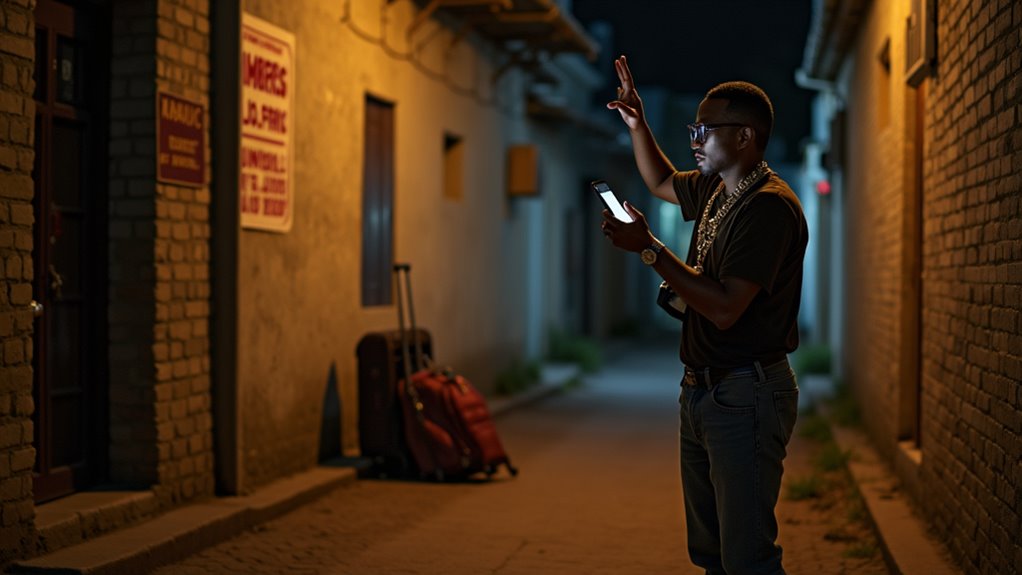
Learn which dangerous tourist mistakes could ruin your South African vacation—from township visits to ATM scams.
When visiting South Africa, don’t drive without researching routes, enter townships without guides, leave valuables visible in vehicles, carry large cash amounts, or walk alone after dark. Avoid neglecting health precautions, trusting strangers too quickly, staying in unsecured accommodations, or skipping travel insurance. Be cautious at ATMs, during night travel, and in malaria-prone regions. These simple precautions will help guarantee your South African adventure remains memorable for all the right reasons.
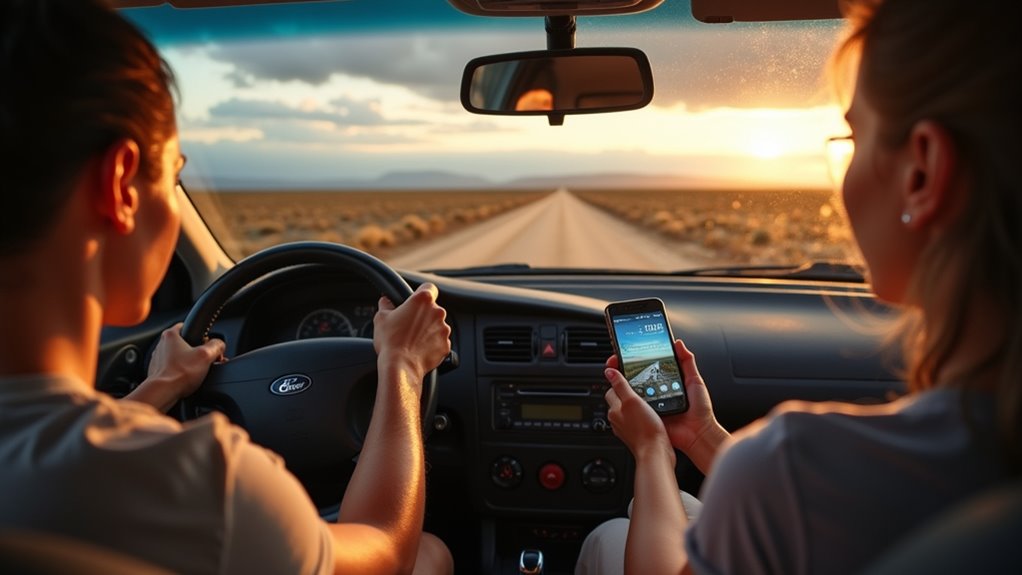
When driving in South Africa, thorough route planning isn’t just a recommendation—it’s essential for your safety and enjoyment. Many travelers underestimate the importance of researching road conditions, construction zones, and weather forecasts before setting out.
Don’t ignore local advice about areas to avoid, especially after dark. South African driving habits differ from what you might be used to, so allow extra time and maintain awareness.
Choose a vehicle appropriate for your route—that compact car won’t serve you well on rough rural roads.
Always check your vehicle condition before departing, keep emergency numbers handy, and share your itinerary with someone trustworthy.
Neglecting to budget for tolls, fuel availability, and potential breakdowns can leave you stranded in unfamiliar territory. Some routes like the one from Kruger to Saint Lucia require crossing through Eswatini (Swaziland) border, which involves additional time for border controls and documentation. Planning ahead prevents most roadside emergencies. Avoiding common tourist mistakes can help ensure a smooth and enjoyable driving experience in South Africa.
Although townships offer authentic cultural experiences, venturing into these areas without a local guide puts you at unnecessary risk. Townships often have higher crime rates and navigating their maze-like layouts can be challenging for outsiders unfamiliar with the terrain. Port Louis is a vibrant city that offers a unique cultural experience for visitors.
When visiting South African townships, always:
Organized criminals sometimes impersonate police officers to target travelers through blue light gangs that set up fake checkpoints to commit robberies. Without a guide, you’re more vulnerable to potential dangers and might miss the affluent cultural context that makes township visits meaningful and educational experiences.
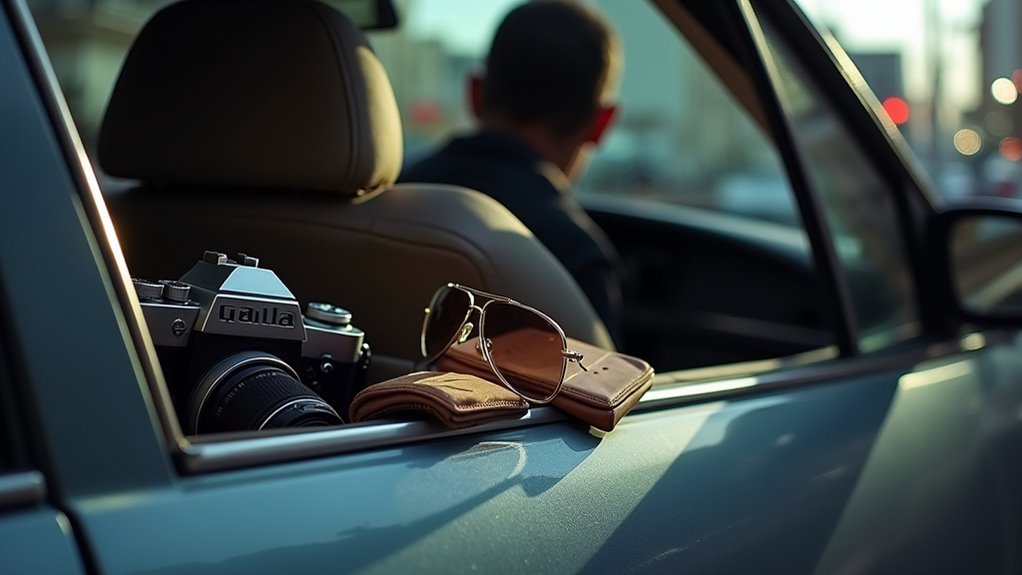
Leaving valuables in plain sight within your vehicle presents one of the most avoidable security risks in South Africa. With approximately 93 vehicles stolen daily and hijackings on the rise, visible items make your car an attractive target for criminals.
Hijackers increasingly prefer direct confrontation over traditional theft, partly to bypass tracking technology. When they spot laptops, phones, or bags in your car, you’re not just risking property loss—you’re potentially endangering yourself.
Data indicates that certain provinces like the Eastern Cape experience up to 8 hijackings for every stolen vehicle.
Always store belongings in the trunk before reaching your destination, not after arriving.
Park in well-lit, secure areas whenever possible, and remain vigilant about your surroundings.
Business vehicles face higher risks, so take extra precautions if driving for work.
These simple habits markedly reduce your chances of becoming another crime statistic.
Carrying large amounts of cash in South Africa substantially increases your personal safety risk and makes you a prime target for criminals. With over 20,000 non-residential robberies recorded recently, criminals actively look for people handling visible cash.
Instead, consider these safer alternatives:
Even South Africa’s vibrant informal markets increasingly accept digital payments, reducing the need for cash while keeping you safer from targeted crime. Robbery incidents inside bank branches have risen by 85% recently, making even traditional banking locations potential risk areas. Choosing between Morocco and Egypt can be a difficult decision, as both countries offer unique cultural experiences.
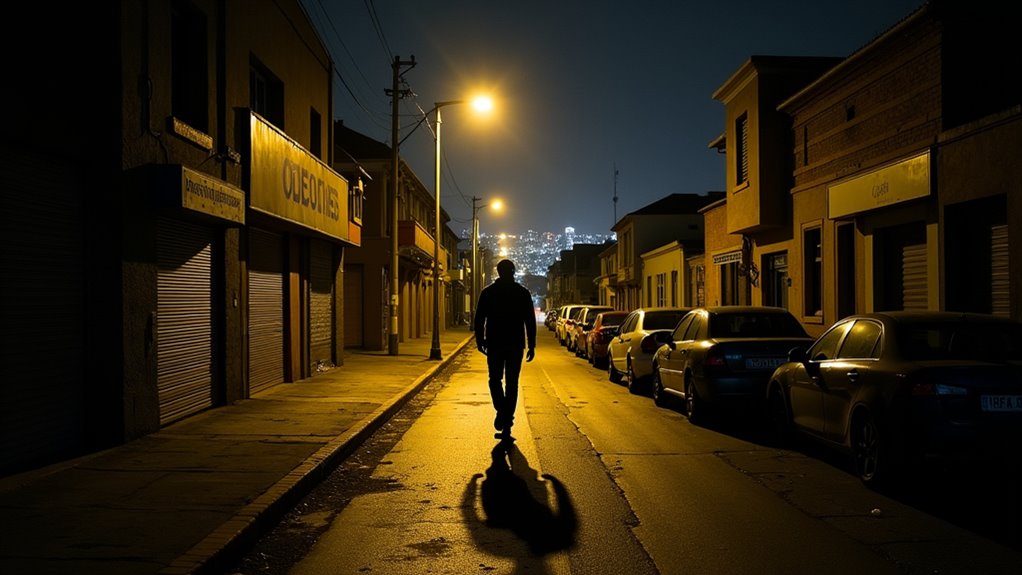
Walking alone after dark in South African cities presents significant safety risks you should avoid whenever possible. Many urban areas rank high on global crime indexes, with violent crimes and robberies being particularly common after nightfall.
Instead, travel in groups, use reliable private transportation, or prearrange rides through reputable services. If you must walk, stick to well-lit, populated areas and avoid isolated streets.
Seek advice from locals about safe neighborhoods and routes—their knowledge is invaluable for orienting oneself in urban environments safely. The Maldives and Seychelles are two popular paradise destinations that may offer a safer alternative for your travels.
Remember that crime rates vary considerably between cities and neighborhoods. South Africa has four major cities that rank among the top 10 most crime-ridden cities globally, making safety precautions essential. Some areas with active nightlife may feel safer due to crowds, but remain vigilant.
Keep emergency numbers saved on your phone and consider using safety apps when moving around unfamiliar areas after sunset.
While GPS technology offers convenience for navigation, relying solely on it in South Africa without local research can lead you into dangerous situations. GPS apps prioritize speed over safety, potentially routing you through high-risk townships or areas experiencing unrest.
To navigate South Africa safely:
Prioritize local knowledge when exploring South Africa – technology alone won’t guarantee your safety.
Remember the tragic case of travelers who followed GPS into dangerous areas with fatal consequences. Google Maps has even altered South African routes due to safety concerns, highlighting the importance of supplementing technology with local knowledge. Recently, Google navigation apps no longer direct travelers through Nyanga township and surrounding areas after several serious incidents occurred there. Considering Alexandria and Hurghada as travel destinations can provide an alternative perspective on the unique experiences each city offers.

Highway travel after sunset in South Africa presents serious risks that shouldn’t be underestimated. Fatal crash rates spike dramatically after dark due to poor visibility, fatigued drivers, and increased presence of intoxicated road users.
Many South African highways lack adequate lighting, making it difficult to spot hazards like pedestrians, animals, or debris. Your reaction time is considerably reduced, especially on wet roads.
Criminal incidents also increase at night, with higher risks of hijackings and fake roadblocks in isolated areas where emergency response is slower. Choosing between Cape Town and Durban can also impact your highway travel safety.
Driver fatigue becomes dangerous on long stretches, potentially causing microsleep episodes and impaired judgment. Plus, breakdown services are less available after hours.
For your safety, schedule long-distance travel during daylight hours and arrive at your destination before dark.
When accessing cash in South Africa, you should strictly avoid using ATMs in isolated or poorly lit areas. These locations present significant security risks, particularly in rural regions and after dark. Card skimming devices and surveillance cameras can be installed undetected at remote ATMs.
Never use isolated ATMs in South Africa – they pose major security threats, especially in rural areas after dark.
For safe ATM usage in South Africa:
This precaution is especially important in areas with lower population density where assistance mightn’t be readily available. The Northern Cape has experienced an increase in ATM scams where criminals work in groups to target vulnerable users. Plus, it is important to be aware of the safety guidelines provided in the Qatar Safety Guide to ensure your overall security when traveling.

Travelers to South Africa should never underestimate the importance of health precautions that could make the difference between an enjoyable trip and a medical emergency.
If you’re visiting Limpopo or Mpumalanga, take malaria prevention seriously—start medication before arrival and use insect repellents consistently. Don’t skip recommended vaccinations like hepatitis A and typhoid. Yellow fever vaccination is mandatory if arriving from endemic countries.
Be vigilant about food and water safety by avoiding unpasteurized dairy, raw vegetables, and undercooked meat. Only drink treated or bottled water in uncertain areas. During outdoor activities, always stay inside vehicles during game park safaris to avoid potentially dangerous wild animal attacks. Venomous snakes are also a significant threat to be aware of when exploring certain regions of South Africa.
South Africa has high HIV rates, so always practice safe sex if engaging with new partners. Use condoms and consider pre-exposure prophylaxis if you’re at higher risk. Your health shouldn’t be the souvenir you bring home.
South Africa’s vibrant street culture can quickly turn dangerous if you’re not careful about engaging with strangers who approach you unexpectedly. With one of the highest rates of street harassment and sexual violence globally, caution is essential, especially for women who often experience harassment from an early age.
When maneuvering through public spaces in South Africa, follow these safety guidelines:
Remember that local authorities may not respond effectively to harassment complaints, so prevention is your best strategy. This is particularly important in South Africa, which is part of the sub-Saharan region where sexual violence incidents peak during adolescence. Choosing between Luxor or Alexandria as your Nile destination can significantly impact your overall experience in Egypt.
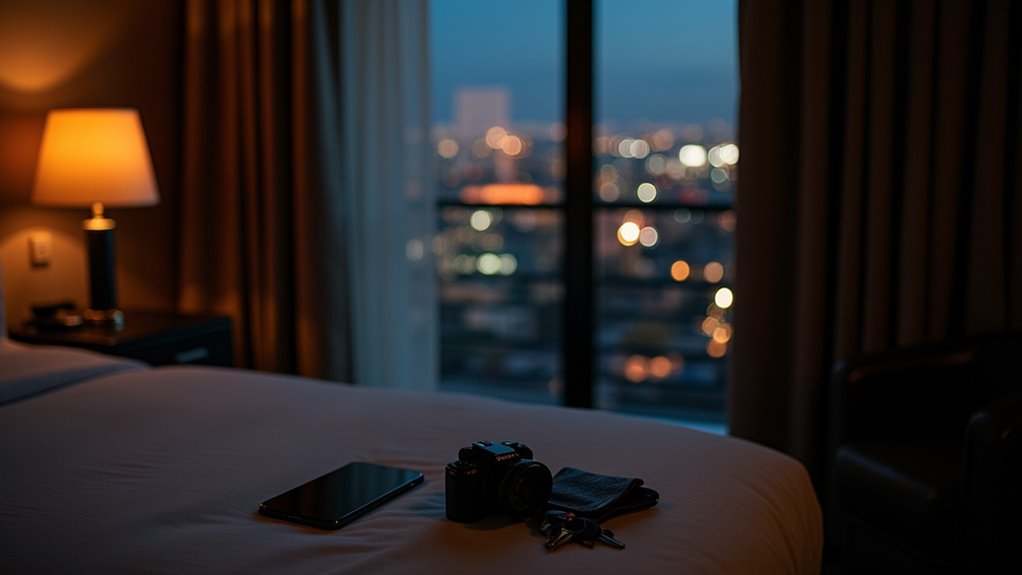
Securing your accommodation properly stands as one of the most critical safety measures you’ll need to take when visiting South Africa. Always lock your doors and windows, even when you’re inside your room. Never leave valuables visible or unattended in your room—use the safe provided by your hotel.
Before booking, research the security features of potential accommodations and read previous guest reviews focusing on safety concerns. Discover Oman’s safety tips for valuable insights on ensuring a secure stay.
When staying in shared spaces, ensure common areas remain locked and secure. Be wary of anyone claiming to be staff without proper identification.
Don’t walk through poorly lit paths around your accommodation, especially at night. Familiarize yourself with emergency procedures and keep local emergency numbers handy.
Report any security incidents to management immediately to protect yourself and other guests. Remember that most travelers experience no issues when they follow basic safety precautions and maintain awareness of their surroundings.
While visiting South Africa might seem like a straightforward adventure, skipping travel insurance could become your most costly mistake. Most US health insurance plans, including Medicare, aren’t accepted at South African medical facilities, leaving you vulnerable to significant financial risk.
Ignoring travel protection for your South African journey could leave you medically stranded and financially devastated.
Consider these essential points before traveling without coverage:
Although not mandatory for entry, exhaustive travel insurance averaging just 5% of your total trip cost provides peace of mind against potential disasters. The popularity of single-trip travel insurance in South Africa reflects growing awareness of these risks, as it constitutes over 61% of the market. Cairo is generally considered safe to visit for most travelers, but it’s important to exercise caution and be aware of your surroundings.
Don’t let an avoidable oversight turn your dream African adventure into a financial nightmare.
South Africa’s beauty is like a diamond—stunning but requiring careful handling. Remember, 97% of visitors who follow these precautions report trouble-free trips. You’ve got the roadmap now: plan routes carefully, protect valuables, seek local guidance, and stay vigilant. By avoiding these common pitfalls, you’ll experience the country’s incredible landscapes, wildlife, and cultures without unnecessary risks. South Africa rewards the prepared traveler with unforgettable memories.